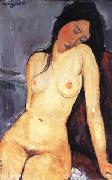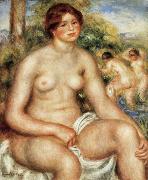
Oil On
Canvas, Real Flavor of Old Masters
|
Amedeo Modigliani
|
|||
|
|
|||
| Italian Expressionist Painter and Sculptor, 1884-1920 Amedeo Clemente Modigliani (July 12, 1884 ?C January 24, 1920) was an Italian artist of Jewish heritage, practicing both painting and sculpture, who pursued his career for the most part in France. Modigliani was born in Livorno (historically referred to in English as Leghorn), in northwestern Italy and began his artistic studies in Italy before moving to Paris in 1906. Influenced by the artists in his circle of friends and associates, by a range of genres and art movements, and by primitive art, Modigliani's œuvre was nonetheless unique and idiosyncratic. He died in Paris of tubercular meningitis, exacerbated by poverty, overworking, and an excessive use of alcohol and narcotics, at the age of 35. | |||
|
|
|||
|
|
Seated Nude Amedeo Modigliani10.jpg Painting ID:: 10520 Visit European Gallery |
1916, oil on canvas. 36 3/8 x 23 1/2 ins(92.4x59.8cm). Courtauld Institute of Art Gallery, London. | |
Height Width |
INS/CM |
||
|
X |
|
||
|
|
|||
|
Pierre Renoir
|
|||
|
|
|||
| French Impressionist Painter, 1841-1919 Pierre-Auguste Renoir (February 25, 1841?CDecember 3, 1919) was a French artist who was a leading painter in the development of the Impressionist style. As a celebrator of beauty, and especially feminine sensuality, it has been said that "Renoir is the final representative of a tradition which runs directly from Rubens to Watteau". Renoir's paintings are notable for their vibrant light and saturated color, most often focusing on people in intimate and candid compositions. The female nude was one of his primary subjects. In characteristic Impressionist style, Renoir suggested the details of a scene through freely brushed touches of color, so that his figures softly fuse with one another and their surroundings. His initial paintings show the influence of the colorism of Eugene Delacroix and the luminosity of Camille Corot. He also admired the realism of Gustave Courbet and Edouard Manet, and his early work resembles theirs in his use of black as a color. As well, Renoir admired Edgar Degas' sense of movement. Another painter Renoir greatly admired was the 18th century master François Boucher. A fine example of Renoir's early work, and evidence of the influence of Courbet's realism, is Diana, 1867. Ostensibly a mythological subject, the painting is a naturalistic studio work, the figure carefully observed, solidly modeled, and superimposed upon a contrived landscape. If the work is still a 'student' piece, already Renoir's heightened personal response to female sensuality is present. The model was Lise Tr??hot, then the artist's mistress and inspiration for a number of paintings. In the late 1860s, through the practice of painting light and water en plein air (in the open air), he and his friend Claude Monet discovered that the color of shadows is not brown or black, but the reflected color of the objects surrounding them. Several pairs of paintings exist in which Renoir and Monet, working side-by-side, depicted the same scenes (La Grenouill??re, 1869). One of the best known Impressionist works is Renoir's 1876 Dance at Le Moulin de la Galette (Le Bal au Moulin de la Galette). The painting depicts an open-air scene, crowded with people, at a popular dance garden on the Butte Montmartre, close to where he lived. On the Terrace, oil on canvas, 1881, Art Institute of ChicagoThe works of his early maturity were typically Impressionist snapshots of real life, full of sparkling colour and light. By the mid 1880s, however, he had broken with the movement to apply a more disciplined, formal technique to portraits and figure paintings, particularly of women, such as The Bathers, which was created during 1884-87. It was a trip to Italy in 1881, when he saw works by Raphael and other Renaissance masters, that convinced him that he was on the wrong path, and for the next several years he painted in a more severe style, in an attempt to return to classicism. This is sometimes called his "Ingres period", as he concentrated on his drawing and emphasized the outlines of figures. After 1890, however, he changed direction again, returning to the use of thinly brushed color which dissolved outlines as in his earlier work. From this period onward he concentrated especially on monumental nudes and domestic scenes, fine examples of which are Girls at the Piano, 1892, and Grandes Baigneuses, 1918-19. The latter painting is the most typical and successful of Renoir's late, abundantly fleshed nudes. A prolific artist, he made several thousand paintings. The warm sensuality of Renoir's style made his paintings some of the most well-known and frequently-reproduced works in the history of art.. | |||
|
|
|||
|
|
Seated Nude new3/Pierre Renoir-338624.jpg Painting ID:: 30158 Visit European Gallery |
mk64 1914 Oil on canvas 81.4x67.5cm Chicago, | |
Height Width |
INS/CM |
||
|
X |
|
||
|
|
|||
|
Eugene Delacroix
|
|||
|
|
|||
| French Romantic Painter, 1798-1863 For 40 years Eugene Delacroix was one of the most prominent and controversial painters in France. Although the intense emotional expressiveness of his work placed the artist squarely in the midst of the general romantic outpouring of European art, he always remained an individual phenomenon and did not create a school. As a personality and as a painter, he was admired by the impressionists, postimpressionists, and symbolists who came after him. Born on April 28, 1798, at Charenton-Saint-Maurice, the son of an important public official, Delacroix grew up in comfortable upper-middle-class circumstances in spite of the troubled times. He received a good classical education at the Lycee Imperial. He entered the studio of Pierre Narcisse Guerin in 1815, where he met Theodore Gericaul | |||
|
|
|||
|
|
Seated Nude new12/Eugene Delacroix-668562.jpg Painting ID:: 38616 Visit European Gallery |
mk138 c.1820 Oil on paper laid on canvas 81.5x65cm | |
Height Width |
INS/CM |
||
|
X |
|
||
|
|
|||
|
Hugh Ramsay
|
|||
|
|
|||
| Australian portrait painter , 1877 - 1906 was an Australian artist. Ramsay was born in Glasgow, Scotland, son of John Ramsay. He moved with his family to Melbourne in 1878. He was educated at Essendon Grammar School, and joined classes at the National Gallery of Victoria at age 16 under Lindsay Bernard Hall and became one of the most brilliant students ever trained there. He won several first prizes, and at the competition for the travelling scholarship held in 1899 was narrowly beaten by Max Meldrum, another student of unusual ability. Ramsay went to Europe in September 1900 and was fortunate in finding a kindred spirit, George Washington Lambert, on the same vessel. Arriving at Paris he entered Acad??mie Colarossi and was soon recognized as a student of great potential. He sent five pictures to the 1902 exhibition of La Soci??t?? Nationale des Beaux Arts and four of these were accepted and hung together. No greater compliment could have been paid to a young student. Another Australian student whose studio was in the same building, Ambrose McCarthy Patterson (nephew of Nellie Melba, then at the height of her fame). Ramsay was introduced to Melba, who gave him a commission for a portrait and would no doubt have been able to help him in his career. Unfortunately Ramsay became ill in Paris, and it became necessary for him to return to the warmer climate of Australia and the opportunity to paint Melba was missed. Before leaving Europe he had exhibited four pictures at the British Colonial Art Exhibition held in London at the Royal Institute galleries. Returning to Australia, in spite of failing health, Ramsay succeeded in doing some remarkable work including "The Sisters" now in the Sydney gallery, the "Lady with a Fan" (possibly his most famous painting), the portrait of David Scott Mitchell, and his own portrait now in the Melbourne gallery. He gradually became weaker and died on 5 March 1906. | |||
|
|
|||
|
|
Seated nude new16/Hugh Ramsay-752735.jpg Painting ID:: 42201 Visit European Gallery |
mk167 1896 Oil | |
Height Width |
INS/CM |
||
|
X |
|
||
|
|
|||










